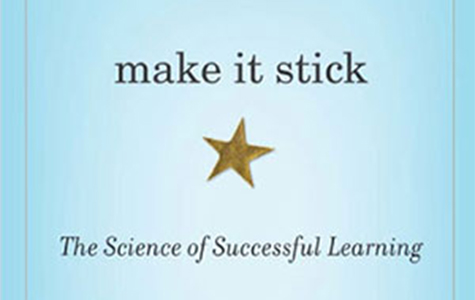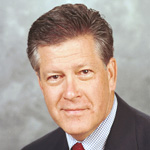
An untold story emerging from cognitive psychology research is that many of us have been going about learning and memorization in all the wrong ways.
That’s a central message of “Make it Stick: The Science of Successful Learning,” a new research-based book that offers students of all ages a clear and compelling primer on the best and worst ways to store and retrieve new knowledge.
Released this month by Harvard University Press/Belknap, the book is co-authored by psychologists Henry L. “Roddy” Roediger III and Mark A. McDaniel, leading experts on human learning and memory at Washington University in St. Louis, along with nonfiction writer and novelist Peter C. Brown.
Roediger, PhD, the James S. McDonnell Distinguished University Professor in Arts & Sciences, and McDaniel, PhD, professor of psychology in Arts & Sciences, provided the research for the book. Brown interviewed many people whose personal stories are woven into the narrative to illustrate and explain the underlying science. The resulting text is highly accessible for people of all ages who seek to improve their abilities to learn and remember.

“Many popular study techniques rely on lots of re-reading and repetitive review in an attempt to force new material into memory, but research shows that gains from this approach are fleeting and often leave student with a false sense of confidence about how well they know a subject,” Roediger said.
“What really matters when it comes to making use of new knowledge is your ability to retrieve it when you need it,” Roediger said. “This book offers concrete tips on study methods that will help you store information in ways that make it more accessible for the long term.
“One of our main points is that students need to practice retrieving information as a regular part of studying. This way they will have the information at their mental fingertips for use when they need it. Retrieval practice at spaced intervals also slows forgetting. Active retrieval is critical for long-term retention.”
McDaniel also is co-director of Washington University’s Center for Integrative Research on Cognition, Learning, and Education (CIRCLE), which was established in 2011 to evaluate and implement new teaching methods using lessons drawn from the latest evidence-based research in the cognitive, learning and education sciences.

“Students are sometimes slow to embrace the study techniques that we talk about in the book, such as testing or spacing out practice, for several reasons,” McDaniel said. “These recommended techniques might not produce the immediate gains in performance that students usually see from their typical methods of study, like repeated rereading and review.
“Also, our recommended study strategies often require more effort from students than their usual study activities,” McDaniel said. “We believe that the personal stories related in the book from successful learners help convey the value of these proven techniques and will encourage students to adopt them.”
While Roediger and McDaniel have dedicated their careers to the study of learning and memory, they remain frustrated that many of the most-proven, science-based study techniques continue to be misunderstood and underutilized by teachers, students, coaches, trainers and others who want to become more productive instructors and learners. Thus they teamed up with Brown to create a book that would explain new insights into learning in non-technical language.
“While much remains to be known about learning and its neural underpinnings, a large body of research has yielded principles and practical strategies that can be put to work immediately, at no cost, and to great effect,” the authors suggest in the book’s preface. “This is a book about what people can do for themselves right now in order to learn better and remember longer.”
Among the findings:
- Recalling new material from memory is more productive for robust learning and memory than rereading.
- Quizzing students on material they have read or that has been presented in class leads to better learning and retention than reviewing that material again.
- Interleaving the practice of two or more problem types (for example, math solutions or types of baseball pitches) is more productive than mastering one before moving to another.
- Asking students to grapple with solving a new kind of problem before teaching them the solution results in better learning of the solution when they are shown it.
- A series of cumulative, low-stakes or no-stakes quizzes over the course of a semester works like compound interest, strengthening retention and updating learning.
These strategies, which require more effort and delay learning, are seldom adopted because learners often mistake the increased effort to be an indication of poor learning, whereas the truth is just the opposite — the increased effort leads to stronger learning and better versatility in recalling and applying the knowledge or skill when it’s needed later.